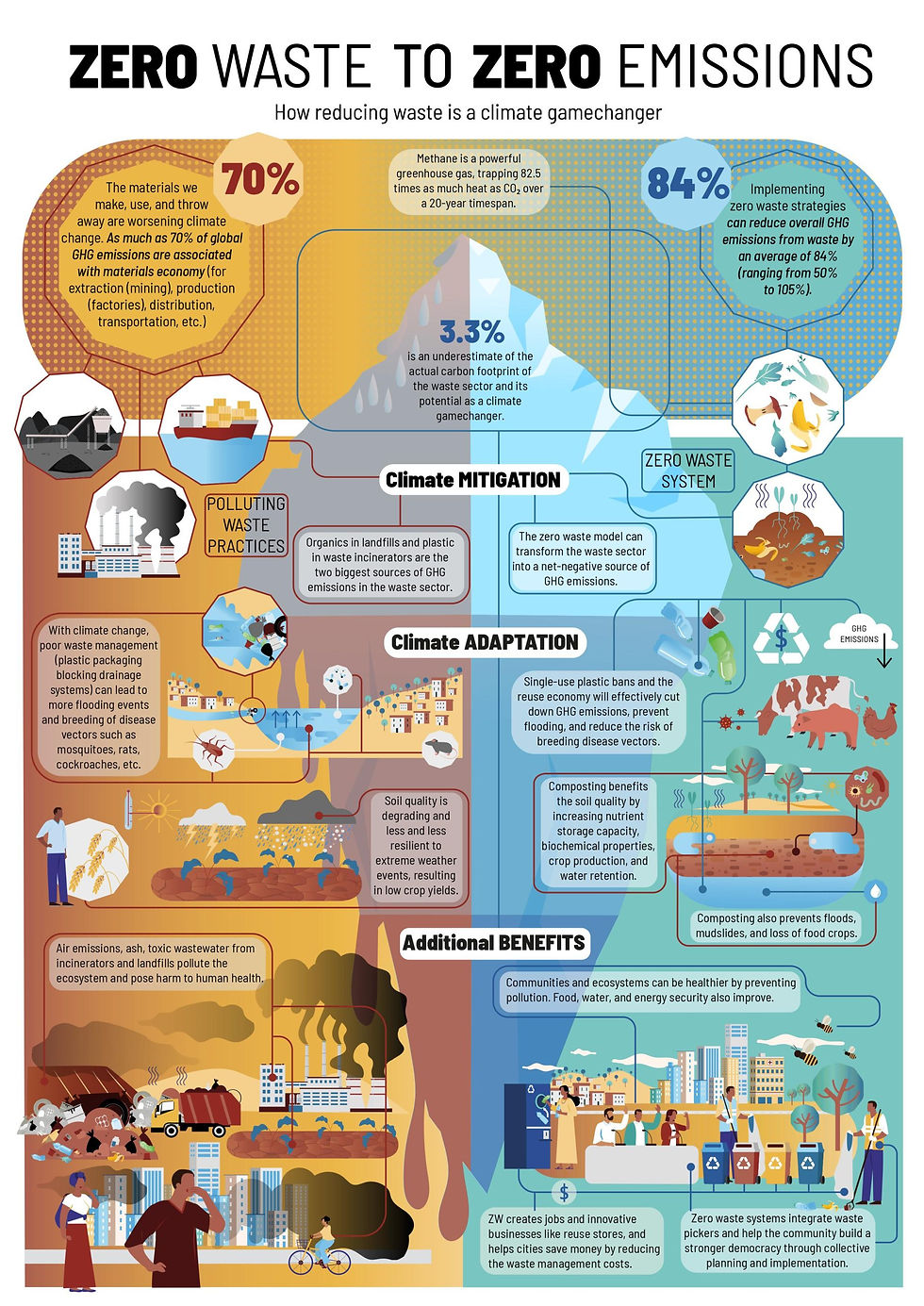Consumer Behaviour and Climate Change
- TAICT ORG

- May 16, 2023
- 4 min read
The discourse on climate change has become a kind of blame game these days. No one is ever doing enough, and the onus of the climate crisis is constantly being placed on regular citizens, claiming that ‘responsible consumption’ can help mitigate the onset of climate change. Certainly when consumer behaviours undergo a transformation, the ensuing shifts in demand prompt companies to adopt more sustainable production practices, resulting in the creation of environmentally friendly products that are less detrimental to the ecosystem. However, these efforts alone are futile without the implementation of adequate changes in policy and government support, which are essential for promoting and sustaining more sustainable lifestyles and business practices. To make an effective impact on global emissions and pollution, the world needs a radical system change, where preservation and living in harmony with nature replace overconsumption and material prosperity as humanity’s core values. However, as we attempt to move closer to this ideal, shaping our lives to reflect a sustainable way of life, that is compatible with the earth's well-being, is essential. As modes of governance and business slowly begin to change, our behavioural patterns will have to follow suit. Here is a list of the top 4 lifestyle changes we can all make, towards living a more sustainable life and preserving the planet for future generations.
1. Consuming Less Meat

The meat industry worldwide has devastating impacts on the environment. 57% of all greenhouse gas emissions from the food industry are a result of meat production. To feed and house cattle, large amounts of land are required, resulting in mass deforestation, and this further results in the loss of biodiversity. If diets were less meat-rich, it means that more of the world’s agricultural land would be available to grow crops for humans. At present, 40% of all agricultural land is used to grow food for livestock. The amount of water used in animal agriculture to raise and slaughter animals is also incredibly high, using up to 20% of the world’s freshwater to produce food for livestock. Reducing the amount of meat in your diet, can have a significant impact on your carbon footprint, and therefore on greenhouse gas emissions.
2. Reducing Waste
This is perhaps the oldest trick in the book, but it does make an impact. Composting your kitchen and garden waste, using reusable cloth bags and metal or glass water bottles, and producing less waste, in general, can have a significantly positive impact on the environment. Waste production globally contributes to about 20% of global methane emissions, and 3.3% of global greenhouse gas emissions, therefore reducing waste production is a game changer in the fight against the climate crisis. Additionally, by using reusable items and recycling materials, we decrease the demand for raw materials and energy-intensive production processes. This, in turn, helps conserve natural resources, reduce deforestation, and mitigate habitat destruction. The 'Zero Waste to Zero Emissions: How Reducing Waste is a Climate Game Changer ' report, explains how effective waste management can help tackle global warming through climate mitigation, adaptation, and additional societal benefits. Have a look at the infographic made by Gaia below to learn more about the report.

available at: https://www.no-burn.org/zerowaste-zero-emissions/
3. Avoiding Fast Fashion
Fast fashion has had a profoundly negative impact on the planet, leading to environmental degradation and social injustices. The fast fashion industry's rapid production and consumption cycle contribute to significant carbon emissions, water pollution, and resource depletion. From the heavy use of toxic chemicals in textile production to the exploitation of low-wage workers in garment factories, the consequences are far-reaching. However, there are alternatives to buying fast fashion that can help mitigate its detrimental effects. One option is to opt for sustainable fashion brands that prioritize ethical sourcing, fair labor practices, and environmentally friendly production processes. Another alternative is to explore second-hand or thrift shopping, which not only reduces the demand for new clothing but also gives garments a longer lifespan. Swapping clothes with friends or participating in clothing rental services can also provide a sustainable way to enjoy different styles without contributing to the fast fashion cycle. By embracing these alternatives, we can move towards a more sustainable and responsible approach to fashion consumption.
4. Transportation
Fossil fuel-based transportation has had a significant negative impact on the planet, contributing to air pollution, climate change, and resource depletion. The burning of fossil fuels releases greenhouse gases, including carbon dioxide, which trap heat in the Earth's atmosphere and contribute to global warming. Additionally, the extraction, refinement, and transportation of fossil fuels cause environmental degradation and can lead to oil spills and other accidents that harm ecosystems. To mitigate these impacts, regular consumers must embrace greener alternatives. For example, opting to walk shorter distances rather than drive, or using trains rather than flights where possible. However, it is equally important for governments and energy companies to take a proactive role in this transition. Policies and regulations should be implemented to gradually phase out fossil fuels and promote the adoption of renewable energy sources, such as solar and wind power. Investing in the development of sustainable infrastructure, expanding public transportation networks, and providing incentives for the production and adoption of electric vehicles are vital steps. By aligning governmental and industrial efforts with individual actions, we can accelerate the shift toward a more sustainable and low-carbon future.
It is important to stress once again, that individual efforts alone are ineffective if not paired with adequate policy measures and changes in the global economic system. Living sustainably should ultimately become the only mode of being, rather than being an option for conscious consumers.
Read more here
https://www.weforum.org/agenda/2022/11/waste-emissions-methane-cities/#:~:text=The%20waste%20sector%20is%20responsible,for%20Incinerator%20Alternatives%20(GAIA).
https://www.dw.com/en/fact-check-is-eating-meat-bad-for-the-environment/a-63595148
https://sentientmedia.org/why-is-eating-meat-bad-for-the-environment/#:~:text=Meat%20production%20significantly%20contributes%20to,This%20leads%20to%20global%20warming.




Comments